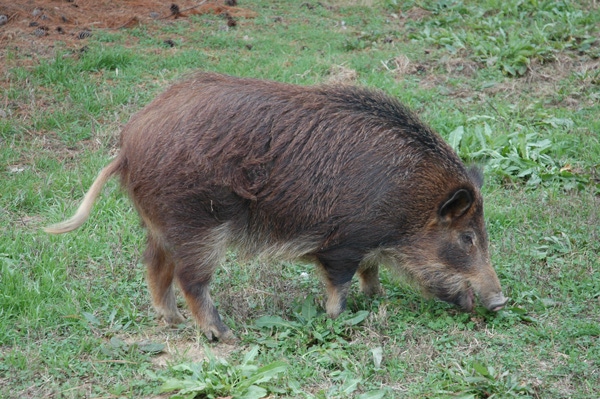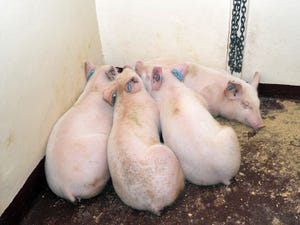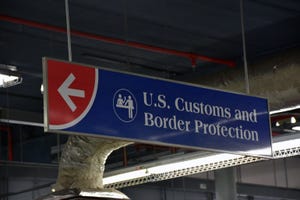USask researchers document feral pig expansion across Canada
Brook notes problem is an economic disaster in the making if left unchecked, not only for crop damage but potential for African swine fever.
January 4, 2022

His warnings have gone largely unheeded, while wild pigs continue rapidly expanding across Western Canada, with no nationally coordinated science-based containment strategy in place and limited provincial resources available. For Brook, it's a recipe for disaster.
"What we have seen on the Prairies in the last 10 years is this absolutely exponential increase in the number of wild pigs," says Brook, who joined the University of Saskatchewan (USask) in 2010, and is one of the few researchers in the country actively tracking the unchecked growth of this destructive and elusive invasive species. "Let's be clear, wild pigs on the Canadian Prairies are expanding completely out of control, and you can quote me on that."
With limited resources, Brook and his graduate students and volunteers with the USask-based Canadian Wild Pig Research Project have been charting increased wild pig sightings across the Prairies, with the majority occurring in Saskatchewan where feral pigs have been spotted in 80% of the province's 296 rural municipalities.
"We have this huge database of over 60,000 individual wild pig occurrences across Canada," says Brook, an associate professor in the Department of Animal and Poultry Science in the College of Agriculture and Bioresources at USask. "Sometimes those are repeats of the same pig wandering by trail cameras, so it's not all necessarily individuals, but either way, that is a lot of occurrence data.
"Saskatchewan has 60% of all of our occurrences in our entire data base and 99% are on the Prairies and 91% are just in Saskatchewan and Manitoba combined. We have a hot spot in East-Central Saskatchewan that isn't that large of an area but it actually probably has the same number of pigs as the rest of Canada combined."
Wild pigs have spread as far as British Columbia and Ontario, and in the past few months, Parks Canada confirmed they were found for the first time in a national park, spotted at Elk Island National Park east of Edmonton. Brook said it is only a matter of time before they invade Prince Albert National Park, and other cherished—and fragile—environment sanctuaries.
"We need to recognize that there are some major strongholds that will never be eradicated, but there are other areas that are nearly pig-free, or could be made so," says Brook. "My worry about recognizing that we won't fully eradicate them from Canada now is I don't want that to be an excuse not to try and not to address this. We still need to act."
The wild pig problem began innocently enough back in the late 1980s when wild boars from Europe were imported by a few Canadian farmers to raise for meat, with most interbred with domestic swine. Some were set free when the boar meat market cooled off, while others escaped due to inadequate fencing and have continued to spread and breed uncontrolled for decades (averaging litters of six every six months), destroying crops, contaminating watersheds and damaging fragile ecosystems while running amok.
"Crop damage is often the biggest economic impact. The U.S. loses 2.5 billion dollars per year just in crop damage alone due to wild pigs," says Brook, who noted the problem is an economic disaster in the making for Prairie producers, if left unchecked. "No question the potential is to get into the tens of millions just in crop damage alone. Disease is harder to estimate in terms of cost, but we do know that when we had mad cow disease, one farm in Alberta had one case and the whole country shut down. So certainly, if we had African swine fever in one wild pig, it would cost millions upon millions to address it. And it's also harder to put a value on wetlands and clean freshwater and ecosystems in general; they are invaluable."
Growing to sometimes more than 600 pounds, wild pigs are aggressive with razor sharp tusks and have been known to attack humans, including a Texas woman killed in her driveway two years ago. Brook also noted a major recall of spinach in California due to E-coli, connected to wild pigs contaminating a field and creating a health risk.
So what's the solution? Brook advocates for a multi-pronged approach to containment, since "we have missed our window of opportunity" to eradicate the invasive species. In an ideal world, Brook's wild pig-containment toolbox would include baiting, trapping and the strategic removal of wild pigs using helicopters to capture them. Sport hunting is not part of a viable solution.
"(Helicopter capture) is expensive, but it's highly, highly effective," says Brook. "We net them out of a helicopter and that works great because you can cover huge areas."
However, Brook said the biggest problem is we simply don't know how big of a problem wild pigs have become. Brook's current PhD student Ruth Aschim recently led the first and only scientific survey of wild pig expansion in the country—published in Nature Scientific Reports.
"If Canada is going to get really serious about pigs and try to remove some, or at least control them, then you need data to actually tell you if you are winning or if it is getting worse. We just don't know what the population numbers are," says Brook. "Like a wildfire, the cornerstone for dealing with invasive species is early detection and rapid and aggressive response, and we missed that window.
"It was easy to ignore them through the '90s and the 2000s, but as we are seeing in 2021, you can ignore wild pigs all you want, until you simply can't ignore them anymore. The problem has exploded over a very short timeline and it is painful that all the predictions that we have been making have become absolutely true, in terms of their expansion."
Brook, who calls the uncontrolled spread of wild pigs "an ecological trainwreck," fears it will take a major economic catastrophe or extensive environmental damage to create the impetus to act.
"I believe that a lot of my work with my research team has really been about collecting data and preparing for a big crisis, and hopefully it's not a major disease outbreak," says Brook. "That's a real concern. African swine fever is a major, major concern and it would be a massive hit to our economy. I think we are just waiting for a big crisis to happen, whether it is an outbreak, somebody being killed by a pig, or a major increase in highway collisions. It is unfortunate if we only see major effort after a major crisis occurs."
"People often ask me what the path forward is, what we need to do," Brook adds. "What we desperately need is leadership and a coordinated effort. I am happy to talk about the details of which technique is better at finding pigs and which is better at removing them, and that is important. But the most important thing we need is for all stakeholders to come together on this, recognize it is a problem, and deal with it before it is too late."
You May Also Like



